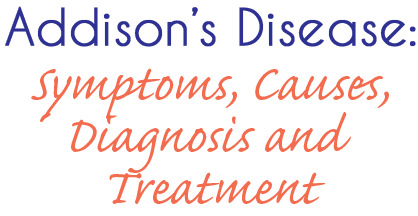Addison’s disease (also known as primary adrenal insufficiency or hypoadrenalism) is a rare disorder of the adrenal glands.
The adrenal glands are two small glands that sit on top of the kidneys. They produce two essential hormones: cortisol and aldosterone.
In Addison’s disease, the adrenal gland is damaged, and not enough cortisol and aldosterone are produced.
About 8,400 people in the UK have Addison’s disease. It can affect people of any age, although it’s most common between the ages of 30 and 50. It’s also more common in women than men.
Early-stage symptoms of Addison’s disease are similar to other more common health conditions, such as depression or flu. You may experience:
fatigue (lack of energy or motivation)
muscle weakness
low mood
loss of appetite and unintentional weight loss
increased thirst
Over time, these problems may become more severe and you may experience further symptoms, such as dizziness, fainting, cramps and exhaustion. You may also develop small areas of darkened skin, or darkened lips or gums.
Although these symptoms aren’t always caused by Addison’s disease, you should see your GP, so they can be investigated.
Read more about the symptoms of Addison’s disease and diagnosing Addison’s disease.
Why it happens
The condition is usually the result of a problem with the immune system, which causes it to attack the outer layer of the adrenal gland (the adrenal cortex), disrupting the production of steroid hormones aldosterone and cortisol. It’s not clear why this happens, but it’s responsible for 70-90% of cases in the UK.
Other potential causes include conditions that can damage the adrenal glands, such as tuberculosis (TB), although this is uncommon in the UK.
Read more about the causes of Addison’s disease.
Treating Addison’s disease
Addison’s disease is treated with medication to replace the missing hormones. You’ll need to take the medication for the rest of your life.
With treatment, symptoms of Addison’s disease can largely be controlled. Most people with the condition live a normal lifespan and are able to live an active life, with few limitations.
However, many people with Addison’s disease also find they must learn to manage bouts of fatigue and there may be associated health conditions, such as diabetes or an underactive thyroid.
People with Addison’s disease must be constantly aware of the risk of a sudden worsening of symptoms, called an adrenal crisis. This can happen when the levels of cortisol in your body fall significantly.
An adrenal crisis is a medical emergency. If left untreated, it can be fatal. If you or someone you know has Addison’s disease and is experiencing severe symptoms, dial 999 for an ambulance.
Read more about treating Addison’s disease.
